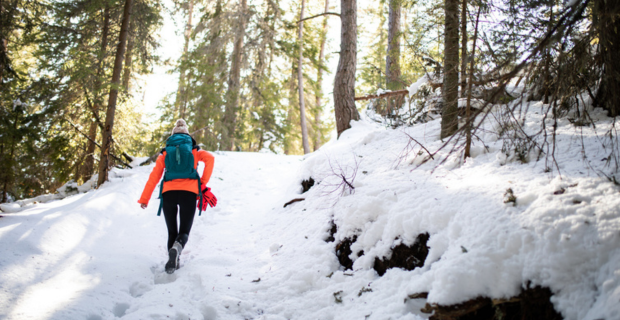Date Published: 2023/12/10
Read Time: mins
Safety guidelines for winter hiking

When the weather cools, you don't have to give up on all the fabulous hikes you've taken throughout the summer and fall months. You need to make a few modifications to ensure safe winter hiking. There are a few added risks, but more preparation and planning can improve each fallback significantly. Knowing how to prepare for these hikes can make all the difference in your experience. Here are some tips to guide you.
1: Know your limits
Before any winter hiking takes place, make sure you know your limits. If you have mobility concerns or a heart condition, check with your doctor about strategies to prepare and protect yourself. Always dress for the weather and be sure you have good-quality footwear that minimize the risk of slipping.
2: Always go with someone
Hiking alone can be an invigorating experience but leave that for the spring and summer months. As the weather becomes more challenging, it's always a good idea to hike with someone else. If you head out for a short walk on your own, be sure to tell someone where you are going. Have a planned route in mind, especially if you are heading out on a trail that is new to you.
3: You'll need to improve your visibility
From the bright, glaring light of the sun reflecting off the snow to cloudy or foggy days, you’re likely to have poor visibility during the winter months. You can improve this in several ways. First, if you're hiking when it's dark out, wear reflective clothing. Next, use a headlamp to keep your hands free but ample light on the path in front of you. Finally, be sure you are wearing sunglasses designed for snow glare protection.
4: Prepare for and know the signs of hypothermia
It is also essential to know the risks associated with hypothermia, which can happen even in a short time when exposed to temperature changes. If you are sweating due to the intensity of the hike, that creates moisture that can lead to a drop in skin and body temperature that's dangerous.
You'll want to be sure that, especially on longer hikes, you have what you need to deal with a risk like this, including:
- A way to contact someone without WiFi service
- A change of clothing that allows you to get out of wet clothing, such as after falling into the snow
- An extra blanket and a thermos with warm fluids can also be helpful if you need to stop and wait for help
If you find yourself not feeling well or struggling to remain awake, you'll benefit from having immediate help like this available to you.
5: Remember to stay hydrated
Staying hydrated is critical when it comes to hiking, and that is no different in the winter months. You'll want to ensure that you're bringing water with you or something to keep you hydrated and help maintain electrolytes while you're walking on that hike.
Also, a thermos is important here since water will freeze in an average bottle. Look for an insulated container that will help to minimize the risk of cold freezing.
Dress for wintertime hiking success
Along with your waterproof pack that has an extra change of clothes (don't forget the dry socks) and hypothermia gear, you'll need to dress properly for the colder weather. Wearing too much isn't ideal either since that's going to cause your body to sweat. Here are a few guidelines to remember:
- Choose slip-resistant footwear with good traction
- Wear layers. You can always take off the outer jackets or add on more clothing as needed
- Keep your head and hands covered since these are areas most commonly impacted by frostbite first
Get a quote today for the insurance you need
As you get ready for winter hiking, make sure you're prepared for what's happened, especially when it comes to RV insurance. Contact Orbit Insurance Services today for a quote or to ensure your policy is up to date.